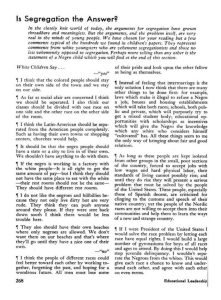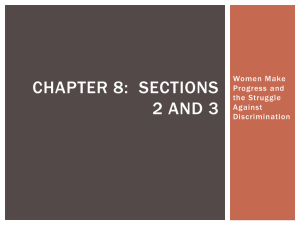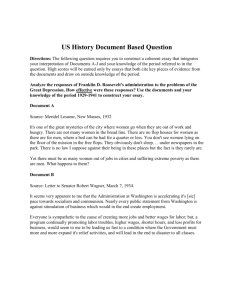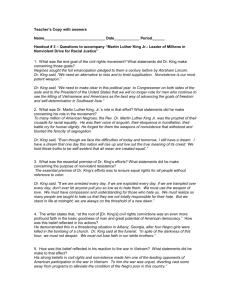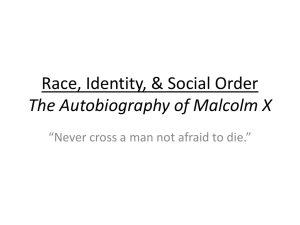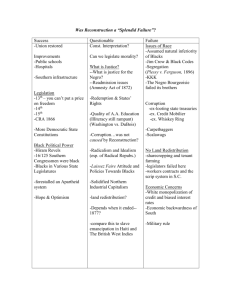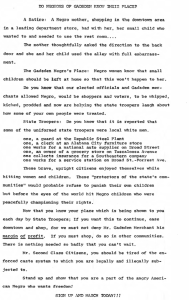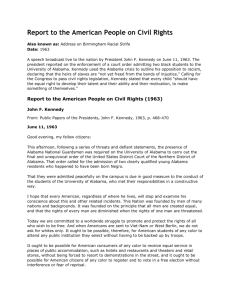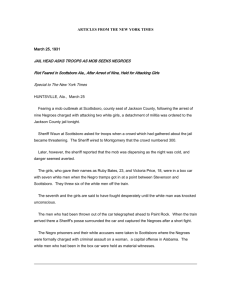King Addressess AFLCIO
advertisement
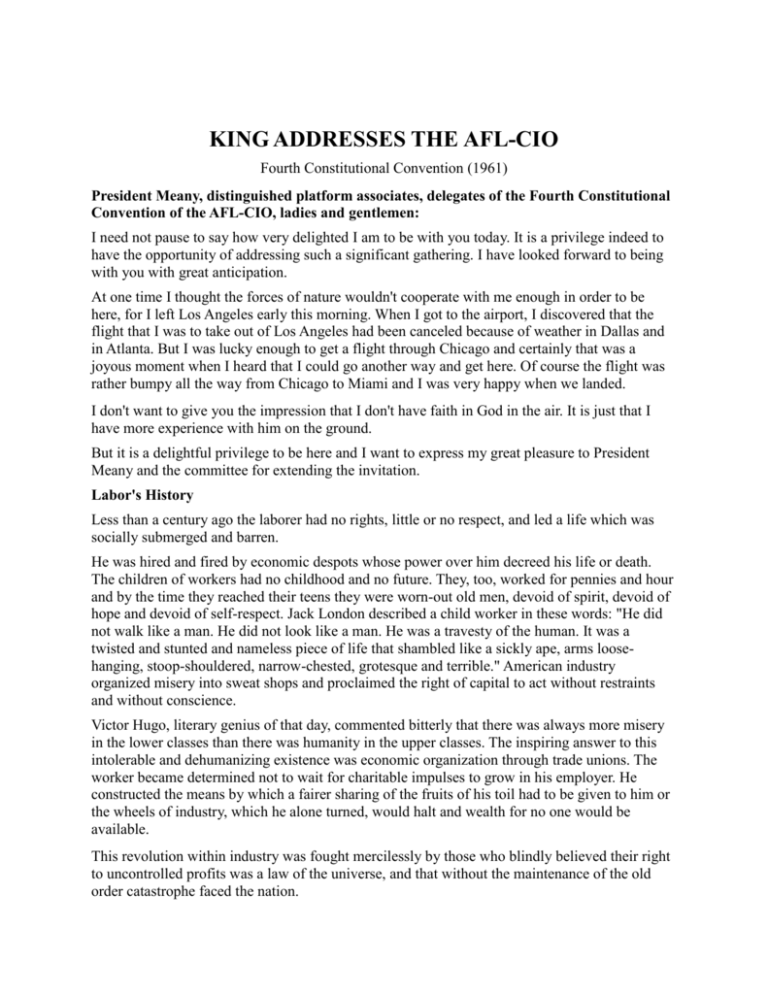
KING ADDRESSES THE AFL-CIO Fourth Constitutional Convention (1961) President Meany, distinguished platform associates, delegates of the Fourth Constitutional Convention of the AFL-CIO, ladies and gentlemen: I need not pause to say how very delighted I am to be with you today. It is a privilege indeed to have the opportunity of addressing such a significant gathering. I have looked forward to being with you with great anticipation. At one time I thought the forces of nature wouldn't cooperate with me enough in order to be here, for I left Los Angeles early this morning. When I got to the airport, I discovered that the flight that I was to take out of Los Angeles had been canceled because of weather in Dallas and in Atlanta. But I was lucky enough to get a flight through Chicago and certainly that was a joyous moment when I heard that I could go another way and get here. Of course the flight was rather bumpy all the way from Chicago to Miami and I was very happy when we landed. I don't want to give you the impression that I don't have faith in God in the air. It is just that I have more experience with him on the ground. But it is a delightful privilege to be here and I want to express my great pleasure to President Meany and the committee for extending the invitation. Labor's History Less than a century ago the laborer had no rights, little or no respect, and led a life which was socially submerged and barren. He was hired and fired by economic despots whose power over him decreed his life or death. The children of workers had no childhood and no future. They, too, worked for pennies and hour and by the time they reached their teens they were worn-out old men, devoid of spirit, devoid of hope and devoid of self-respect. Jack London described a child worker in these words: "He did not walk like a man. He did not look like a man. He was a travesty of the human. It was a twisted and stunted and nameless piece of life that shambled like a sickly ape, arms loosehanging, stoop-shouldered, narrow-chested, grotesque and terrible." American industry organized misery into sweat shops and proclaimed the right of capital to act without restraints and without conscience. Victor Hugo, literary genius of that day, commented bitterly that there was always more misery in the lower classes than there was humanity in the upper classes. The inspiring answer to this intolerable and dehumanizing existence was economic organization through trade unions. The worker became determined not to wait for charitable impulses to grow in his employer. He constructed the means by which a fairer sharing of the fruits of his toil had to be given to him or the wheels of industry, which he alone turned, would halt and wealth for no one would be available. This revolution within industry was fought mercilessly by those who blindly believed their right to uncontrolled profits was a law of the universe, and that without the maintenance of the old order catastrophe faced the nation. History is a great teacher. Now, every one knows that the labor movement did not diminish the strength of the nation but enlarged it. By raising the living standards of millions, labor miraculously created a market for industry and lifted the whole nation to undreamed of levels of production. Those who today attack labor forget these simple truths, but history remembers them. Labor's next monumental struggle emerged in the thirties when it wrote into federal law the right freely to organize and bargain collectively. It was now apparently emancipated. The days when workers were jailed for organizing, and when in the English Parliament Lord Macauley had to debate against a bill decreeing the death penalty for anyone engaging in a strike, were grim but almost forgotten memories. Yet, the Wagner Act, like any other legislation, tended merely to declare rights but did not deliver them. Labor had to bring the law to life by exercising its rights in practice over stubborn, tenacious opposition. It was warned to go slow, to be moderate, not to stir up strife. But labor knew it was always the right time to do right, and it spread its organization over the nation and achieved equality organizationally with capital. The day of economic democracy was born. The Negro & Labor Negroes in the United States read this history of labor and find it mirrors their own experience. We are confronted by powerful forces telling us to rely on the good will and understanding of those who profit by exploiting us. They deplore our discontent, they resent our will to organize, so that we may guarantee that humanity will prevail and equality will be exacted. They are shocked that action organizations, sit-ins, civil disobedience, and protests are becoming our every day tools, just as strikes, demonstrations and union organization became yours to insure that bargaining power genuinely existed on both sides of the table. We want to rely upon the goodwill of those who oppose us. Indeed, we have brought forward the method of non-violence to give an example of unilateral goodwill in an effort to evoke it in those who have not yet felt it in their hearts. But we know that if we are not simultaneously organizing our strength we will have no means to move forward. If we do not advance, the crushing burden of centuries of neglect and economic deprivation will destroy our will, our spirits and our hopes. In this way labor's historic tradition of moving forward to create vital people as consumers and citizens has become our own tradition, and for the same reasons. This unity of purpose is not an historical coincidence. Negroes are almost entirely a working people. There are pitifully few Negro millionaires and few Negro employers. Our needs are identical with labor's needs, decent wages, fair working conditions, livable housing, old age security, health and welfare measures, conditions in which families can grow, have education for their children and respect in the community. That is why Negroes support labor's demands and fight laws which curb labor. That is why the labor-hater and labor-baiter is virtually always a twin headed creature spewing anti-Negro epithets from one mouth and anti-labor propaganda from the other mouth. The duality of interests of labor and Negroes makes any crisis which lacerates you, a crisis from which we bleed. As we stand on the threshold of the second half of the twentieth century, a crisis confronts us both. Those who in the second half of the nineteenth century could not tolerate organized labor have had a rebirth of power and seek to regain the despotism of that era while retaining the wealth and privileges of the twentieth century. Whether it be the ultra right wing in the form of Birch societies or the alliance which former President Eisenhower denounced, the alliance between big military and big industry, or the coalition of southern Dixiecrats and northern reactionaries, whatever the form, these menaces now threaten everything decent and fair in American life. Their target is labor, liberals, and the Negro people, not scattered "reds" or even Justice Warren, former Presidents Eisenhower and Truman and President Kennedy, who are in truth beyond the reach of their crude and vicious falsehoods. Labor today faces a grave crisis, perhaps the most calamitous since it began its march from the shadows of want and insecurity. In the next ten to twenty years automation will grind jobs into dust as it grinds out unbelievable volumes of production. This period is made to order for those who would seek to drive labor into impotency by viciously attacking it at every point of weakness. Hard core unemployment is now an ugly and unavoidable fact of life. Like malignant cancer, it has grown year by year and continues its spread. But automation can be used to generate an abundance of wealth for people or an abundance of poverty for millions as its human-like machines turn out human scrap along with the machine scrap as a by-product of production. Our society, with its ability to perform miracles with machinery has the capacity to make some miracles for men--if it values men as highly as it values machines. To find a great design to solve a grave problem labor will have to intervene in the political life of the nation to chart a course which distributes the abundance to all instead of concentrating it among a few. The strength to carry through such a program requires that labor know its friends and collaborate as a friend. If all that I have said is sound, labor has no firmer friend than the 20 million Negroes whose lives will be deeply affected by the new patterns of production. To say that we are friends would be an empty platitude if we fail to behave as friends and honestly look to weaknesses in our relationship. Unfortunately there are weaknesses. Labor has not adequately used its great power, its vision and resources to advance Negro rights. Undeniably it has done more than other forces in American society to this end. Aid from real friends in labor has often come when the flames of struggle heighten. But Negroes are a solid component within the labor movement and a reliable bulwark for labor's whole program, and should expect more from it exactly as a member of a family expects more from his relatives than he expects from his neighbors. Impatience with Injustice Labor, which made impatience for long-delayed justice for itself a vital motive force, cannot lack understanding of the Negro's impatience. It cannot speak with the reactionaries calm indifference, of progress around some obscure corner not yet possible even to see. There is a maxim in the law -- justice too long delayed is justice denied. When a Negro leader who has a reputation of purity and honesty which has benefited the whole labor movement criticizes it, his motives should not be reviled nor his earnestness rebuked. Instead, the possibility that he is revealing a weakness in the labor movement which it can ill afford, should receive a thoughtful examination. A man who had dedicated his long and faultless life to the labor movement cannot be raising questions harmful to it any more than a lifelong devoted parent can become the enemy of his child. The report of a committee may smother with legal constructions a list of complaints and dispose of it for the day. But if it buries a far larger truth it has disposed of nothing and made justice more elusive. Discrimination does exist in the labor movement. It is true that organized labor has taken significant steps to remove the yoke of discrimination from its own body. But in spite of this, some unions, governed by the racist ethos, have contributed to the degraded economic status of the Negro. Negroes have been barred from membership in certain unions, and denied apprenticeship training and vocational education. In every section of the country one can find local unions existing as a serious and vicious obstacle when the Negro seeks jobs or upgrading in employment. Labor must honestly admit these shameful conditions, and design the battle plan which will defeat and eliminate them. In this way, labor would be unearthing the big truth and utilizing its strength against the bleakness of injustice in the spirit of its finest traditions. Cementing Fraternal Bonds How can labor rise to the heights of its potential statesmanship and cement its bonds with Negroes to their mutual advantage? First: labor should accept the logic of its special position with respect to Negroes and the struggle for equality. Although organized labor has taken actions to eliminate discrimination in its ranks, the standard for the general community, your conduct should and can set an example for others, as you have done in other crusades for social justice. You should root out vigorously every manifestation of discrimination so that some internationals, central labor bodies or locals may not besmirch the positive accomplishments of labor. I am aware this is not easy nor popular--but the 8 hour day was not popular nor easy to achieve. Nor was outlawing anti-labor injunctions. But you accomplished all of these with a massive will and determination. Out of such struggle for democratic rights you won both economic gains and the respect of the country, and you will win both again if you make Negro rights a great crusade. Second: The political strength you are going to need to prevent automation from becoming a Moloch, consuming jobs and contract gains, can be multiplied if you tap the vast reservoir of Negro political power. Negroes given the vote, will vote liberal and labor because they need the same liberal legislation labor needs. To give just an example of the importance of the Negro vote to labor, I might sight the arresting fact that the only state in the South which repealed the "right to work" law is Louisiana. This was achieved because the Negro vote in that state grew large enough to wipe out anti-labor legislation. Thus, support to assist us in securing the vote can make the difference between success and defeat for us both. You have organizing experience we need and you have an apparatus unparalleled in the nation. You recognized five years ago a moral opportunity and responsibility when several of your leaders, including Mr. Meany, Mr. Dubinsky, Mr. Reuther and Mr. MacDonald and others, projected a two-million dollar campaign to assist the struggling Negroes fighting bitterly in handicapped circumstances in the South. A $10,000 contribution was voted by the ILGWU to begin the drive, but for reasons unknown to me, the drive was never begun. The cost to us in lack of resources during these turbulent, violent years, is hard to describe. We are mindful that many millions thought of as immorally rich, in truth have problems in meeting the budget to properly service their members. So we do not ask that you tax your treasuries. Instead, we ask that you appeal to your members for one dollar apiece to make democracy real for millions of deprived American citizens. For this you have the experience, the organization and most of all, the understanding. If you would do these two things now in this convention -- resolve to deal effectively with discrimination and provide financial aid for our struggle in the South, -- this convention will have a glorious moral deed to add to an illustrious history. The two most dynamic and cohesive liberal forces in the country are the labor movement and the Negro freedom movement. Together we can be architects of democracy in a South now rapidly industrializing. Together we can re-tool the political structure of the South, sending to Congress steadfast liberals who, joining with those from Northern industrial states, will extend the frontiers of democracy for the whole nation. Together we can bring about the day when there will be no separate identification of Negroes and labor. There is no intrinsic difference as I have tried to demonstrate. Differences have been contrived by outsiders who seek to impose disunity by dividing brothers because the color of their skin has a different shade. I look forward confidently to the day when all who work for a living will be one with no thought to their separateness as Negroes, Jews, Italians or any other distinctions. Realizing the American Dream This will be the day when we shall bring into full realization the American dream -- a dream yet unfulfilled. A dream of equality of opportunity, of privilege and property widely distributed; a dream of a land where men will not take necessities from the many to give luxuries to the few, a dream of a land where men will not argue that the color of a man's skin determined the context of his character; a dream of a nation where all our gifts and resources are held not for ourselves alone but as instruments of service for the rest of humanity; the dream of a country where every man will respect the dignity and worth of human personality -- that is the dream. And as we struggle to make racial and economic justice a reality, let us maintain f the struggle to make justice a reality, but we must believe somehow that these prob There is a little song that we sing in the movement taking place in the South. It go heart I do believe we shall overcome." And somehow all over America we must be will be solved before the victory is won. Some of us will have to get scarred up, but we shall overcome. Before the victory But if a physical death is the price that some must pay to free their children and their brothers from a permanent life of psychological death, then nothing could be more moral. Before the victory is won some more will have to go to jail. We must be willing to go to jail and transform the jails from dungeons of shame to havens of freedom and human dignity. Yes, before the victory is won, some will be misunderstood. Some will be called Reds and Communists merely because they believe in economic justice and the brotherhood of man. But we shall overcome. I am convinced that we shall overcome because the arc of the universe is long but it bends toward justice. We shall overcome because Carlisle is right when he says, "No lie can live forever." We shall overcome because William Cullen Bryant is right when he says, "Truth crushed to earth will rise again." We shall overcome because James Russell Lowell was right when he proclaimed: "Truth forever on the scaffold, wrong forever on the throne, yet the scaffold sways the future." And so if we will go out with this faith and with this determination to solve these problems, we will bring into being that new day and that new America. When that day comes, the fears of insecurity and the doubts clouding our future will be transformed into radiant confidence, into glowing excitement to reach creative goals and into an abiding moral balance where the brotherhood of man will be undergirded by a secure and expanding prosperity for all. Yes, this will be the day when all God's children, black men and white men, Jews and Gentiles, Protestants and Catholics will be able to join hands all over the nation and sing in the words of that old Negro spiritual: "Free at Last, Free at Last. Than God Almighty We Are Free at Last." Thank you.
